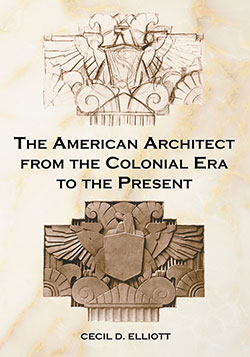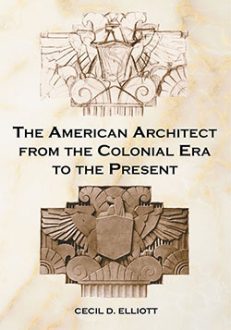The American Architect from the Colonial Era to the Present
Original price was: $49.95.$39.99Current price is: $39.99.
In stock
About the Book
The later Colonial era saw a need to replace the buildings hurriedly assembled by earlier colonists, but competent builders were difficult to find. Capable housewrights were usually well paid and many became respected and prosperous members of their communities, but craft apprenticeships and a gentlemanly taste were two of the primary requirements for becoming an architect. As the profession developed, architects in the Northeast initiated efforts to distinguish between their work and that of housewrights and builders.
This work is a history of the development of architecture as a profession in the United States. It is divided into four chronological sections. Section One covers the beginnings in Colonial times before 1800 when there were no identifiable professionals. Section Two examines architecture from 1800 to the Civil War, a period during which the first architects appeared. Section Three considers the profession from the time of the Civil War to World War I and the strengthening of the profession’s status. Section Four covers architecture since World War I up to the present. Each section discusses the training of architects, standards of practice, general management methods, information sources, minority participation, and other aspects of professional operation, with special attention given to the relationship between the profession’s development and the social history of the periods.
About the Author(s)
Bibliographic Details
Cecil D. Elliott
Format: softcover (7 x 10)
Pages: 199
Bibliographic Info: 54 photos, notes, bibliography, index
Copyright Date: 2003
pISBN: 978-0-7864-1391-1
Imprint: McFarland
Table of Contents
Preface 1
A Note to the Reader 3
BEFORE 1800: COLONIAL ORIGINS
A Compelling Need for Buildings 6
Carpenters, Builders, and Gentlemen 9
Apprenticeship and Education 14
Colonial Books and Libraries 15
Westward Colonization 20
1800 TO THE CIVIL WAR: FORMATION OF THE PROFESSION 21
The New Capital 22
Defining the Profession 24
The Government as a Client 26
Matters of Faith 27
Available Knowledge 29
Professional Libraries 36
Arrivals from Europe 38
The Southern Frontier 41
A Professional Community 42
Architects’ Fees 45
Documents and Contracts 48
State Capitols 51
Westward Movement 54
THE CIVIL WAR TO WORLD WAR I: STRENGTHENING THE PROFESSION 56
Immigration 57
Publications 58
Learning in Europe 62
Learning in the United States 70
The Government’s Own Architects 76
The AIA Revived and Challenged 78
Women Architects 81
Registration 82
Competitions 84
Unfortunate Political Involvements 90
Practices and Partnerships 93
Extending Practices 98
Drawings and Specifications 100
Staff 108
The First African-American Architects 118
Specialization 119
Battling the Government 125
WORLD WAR I TO THE PRESENT: ADAPTATION TO EXTREMES 129
World War I 129
The Small House Movement 132
Estates and Mansions 136
Women in Architecture 139
The American Beaux-Arts 140
Sketch Clubs 145
Government Relations 147
African-American Architects 150
Associated Architects 151
The Great Depression 153
World War II 157
Registration and Reciprocity 158
New Influences on Practice 161
Deprofessionalization 164
The Present 166
Notes 171
Bibliography 185
Index 191
Book Reviews & Awards
“meticulously researched…insightful…highly informative”—Public Library Quarterly; “interesting”—Catholic Library World.






